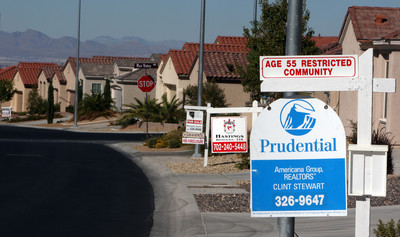Housing woes: Let’s get real

Las Vegas home sellers need to come to grips with the seventh step in the grief recovery process, housing analyst Tim Sullivan said Tuesday.
“Acceptance,” the president of San Diego-based Sullivan Group said. “We’re going to see a 20 percent decline in prices. We’ve got to accept it and move on.”
New home builders, with recent price reductions and $27,000 incentive packages on average, are getting close to the bottom, Sullivan told a group of more than 200 real estate professionals during his seminar at the Four Seasons.
Subtracting incentives from the median new home price of $323,900 in August, new homes’ net prices are about $297,000, compared with a $319,000 net price in 2006, Sullivan said.
“Las Vegas has lost weight and Las Vegas is more flexible again,” said Sullivan, who said he began exercising and dieting himself so he could lose about 30 pounds.
“Like humans, the housing market is organic and we’re in a cycle. Anyone here who’s over 35 has experienced it before,” he said, explaining that he feels much better after losing the extra weight.
The good news, Sullivan said, is cycles are happening more quickly. The last few recessions have lasted about nine months, compared with three to five years in the past, he said.
Some of the signals to look for that will show the housing market has bottomed out will include a resale supply of only seven months’ worth of homes; no more erosion in sales; a further drop in building permits; an increase in mortgage purchase application agreements; a dramatic increase in affordability; and at least one major builder leaving the market.
Bill Hoover, southwest regional president for Pageantry Homes, said his company has been able to balance different cycles in its three markets of Seattle, Phoenix and Las Vegas.
“We started analyzing everything we’re doing a year ago, basically monitoring cash flow,” he said. “It’s the old adage, ‘Cash is king.’ Our owner, Don White, his background is in financing. He’s very judicious in the way he handles money.”
Las Vegas was averaging about 40,000 new home permits a year from 2003 to 2005 when supply skipped ahead of demand, Sullivan Group Vice President Ken Perlman said. The employment-to-permit ratio was skewed by an oversupply that was “masked” by investors, he said.
Permit activity has dropped by more than half. He estimated 18,000 permits this year, which is necessary for the market’s recovery.
Perlman said gross metropolitan product for Las Vegas, a measure similar to the nation’s gross domestic product, is running at about 2.5 percent this year.
Population growth has slowed from 60,000 new residents a year to 50,000 and employment growth has also slowed, but remains positive. The 30,000 new hotel rooms planned for the Strip would create about 43,000 jobs, he said.
“Demand for housing growth is there,” Perlman said. “We believe population growth will ultimately buoy the housing market. I mean, 50,000 people have to live somewhere.”
Tom McCormick, president of Las Vegas-based Astoria Homes, said he was glad to see Sullivan differentiate between the new-home market, which has a two-month supply of inventory, and the resale market, which has a nine-month supply.
“Where we run into trouble as a builder is when everything gets lumped together,” McCormick said. “Builders have been more aggressive in marketing. If you’re looking for a new home, there’s very little to choose from. If we have to come down 20 percent, we’re there with incentives and that’s why we’re able to move homes. The resale market hasn’t adjusted and they’re having trouble.”
Home Builders Research reported a median price of $275,000 on resale closings in August, down about 5 percent from a year ago.
Perlman said Las Vegas has some positive long-term aspects. Home prices remain 86 percent above the median in 2002 and most homeowners have a good deal of equity. Compared with the $740,000 median home price in San Diego, Las Vegas is still relatively affordable, he said.
“Tourism is the ace in the hole for Las Vegas’ economy,” Perlman said, citing gaming revenue that surpassed $10 billion in 2006. “The casino industry is strong.”
Sullivan said people who own homes will be staying in them longer. Investors are still “lurking” out there, but he doesn’t see them coming back strong.
“Hold on. The market is changing and we’ve made the right strides,” he said.
Contact reporter Hubble Smith at hsmith@reviewjournal.com or (702) 383-0491.












